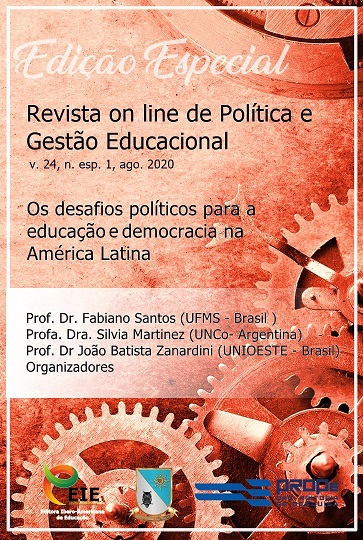Towards a participatory construction of education policy: the school success project in Valparaíso as an alternative proposal
DOI:
https://doi.org/10.22633/rpge.v24iesp1.13790Keywords:
Policy, Education, Justice, Participation, Assessment.Abstract
The article adresses currently predominant means of construction of education policy from a critical perspective, drawing on the results of a study that analyses the case of the national curriculum assessment system in Chile (SIMCE). In particular, we focus on those findings that reveal the predominance of a top-down approach to the understanding of education policy. We argue that this approach raises issues related to social justice, especifically in the dimension of parity of participation. As an alternative approach, a case related to a second project is presented, which consists of the participatory construction of the bases for a large-scale assessment system with a formative purpose, developed in the Municipality of Valparaíso, Chile. On the basis of this experience, the need for more democratic and, therefore, more socially just processes of policy construction is highlighted.
Downloads
References
BOWE, R.; BALL, S.; GOLD, A. Reforming education and changing schools. Case studies in policy sociology. 1a Edición. Londres: Routledge, 1992, p. 192.
BALL, S. J.; JUNEMANN, C. Networks, new governance and education. 1a Edición. Bristol, UK: The Policy Press, 2012, p. 167.
BALL, S. J.; EXLEY, S. Making policy with ‘good ideas’: Policy networks and the ‘intellectuals’of New Labour. Journal of Education Policy, Reino Unido, 25, 2, 151-169, 2010.
BALL, S.; MAGUIRE, M.; BRAUN, A. How schools do policy: Policy enactments in secondary schools. 1a Edición. Londres: Routledge, 2012, p. 173.
BALL, S. J. The micro-politics of the school. Towards a theory of school organization. 1a Edición. Londres y Nueva York: Routledge, 2012, p. 307.
BELLEI, C. El gran experimento: Mercado y privatización de la educación chilena. 1a Edición. Santiago de Chile: LOM, 2015, p. 254.
DE SOUSA, B. Descolonizar el saber, reinventar el poder. 1a Edición. Santiago de Chile: LOM, 2013, p. 117.
ENTMAN, R. Framing bias: Media in the distribution of power. Journal of Communication, Reino Unido, 57, 1, 163-173, 2007.
FLÓREZ, T. Repensar la evaluación a gran escala en función de una formación integral: análisis crítico de los sistemas vigentes y posibles caminos alternativos. In: Arratia, A.; Osandón, L. (eds.). Políticas para el desarrollo del currículum: Reflexiones y propuestas (pp.). Santiago: UCE-MINEDUC y UNESCO, 417-456, 2018.
FRASER, N. Escalas de Justicia. 1a Edición. Barcelona: Herder, 2008, p. 294.
KEDDIE, A. Schooling and social justice through the lenses of Nancy Fraser. Critical Studies in Education. Queensland, Australia,53,3, 263-279, 2012.
LARNER, W. C-change? Geographies of crisis. Dialogues in Human Geography, EE.UU., 1, 3, 319-335, 2011.
LINGARD, B.; SELLAR, S. Globalization, edu-business and network governance: the policy sociology of Stephen J. Ball and rethinking education policy analysis. London Review of Education, Reino Unido, 11, 3, 265–280, 2013.
LINGARD, B.; KEDDIE, A. Redistribution, recognition and representation: working against pedagogies of indifference. Pedagogy, Culture & Society. Queensland, Australia. 21, 3, 427–447.
OLAVE, J.M. Relatos de experiencias de evaluación. Comprensiones Decoloniales de la escuela Chilena.2013-2018. Tesis doctoral, Universidad de Manizales Centro Avanzado de Niñez y Juventud. 2018, p. 243.
STOBART, G. Tiempos de pruebas: Los usos y abusos de la evaluación. 2a Edición. Madrid, España: Morata. 2010, p. 236.











